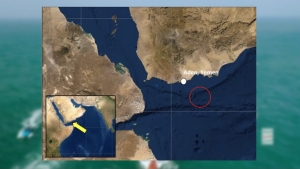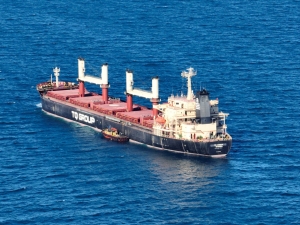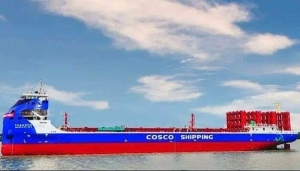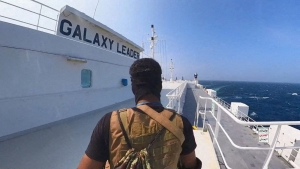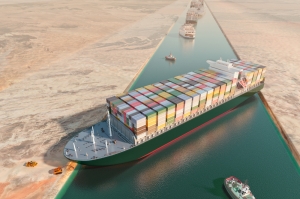News
Latest news
More...
A ship belonging to US-based Eagle Bulk Shipping (NYSE: EGLE) has been hit by a missile in the Gulf of Aden.
The United Kingdom Maritime Trade Operations (UKMTO) office said a Master reported a missile hit the ship’s port side from above approximately 95 nautical miles south east of Aden, Yemen.
The U.S. Central Command has confirmed details of the incident, reporting that the M/V Gibraltar Eagle was hit by an anti-ship ballistic missile fired from Houthi-controlled areas of Yemen. The ship has reported no injuries or significant damage and is continuing its voyage.
The M/V Gibraltar Eagle is a Marshall Islands-flagged bulk carrier owned by an entity of Eagle Bulk Shipping (USA) LLC, based in Stamford, Connecticut. The incident follows an earlier failed missile launch by the Houthis.
“Earlier in the day, at approximately 2 p.m. (Sanaa time), U.S. Forces detected an anti-ship ballistic missile fired toward the Southern Red Sea commercial shipping lanes. The missile failed in flight and impacted on land in Yemen. There were no injuries or damage reported,” the U.S. Central Command said.
“As a result of the impact, the vessel suffered limited damage to a cargo hold but is stable and is heading out of the area,” Eagle Bulk said. “All seafarers onboard the vessel are confirmed to be uninjured. The vessel is carrying a cargo of steel products.”
The Houthi group on Monday claimed an “accurate and direct” hit on an “American ship” and declared all American and British ships and warships as “hostile targets.”
This latest incident is near where another vessel reported a missile landing in the water nearby after being followed by three small boats on Friday, January 12. On that same day, another vessel reported seeing small boats in the same area.
UK-based security firm EOS Risk Group said that the arrival of the Iranian spy ship M/V Behshad in the Gulf of Aden on January 12 heightens the risk of attacks in the area. “MV BEHSHAD is likely providing targeting data to the Houthis ashore in Yemen,” the group said in a post to “X”.
On Sunday, a U.S. fighter jet shot down an anti-ship cruise missile near Hudaydah, Yemen that was fired from Yemen towards the USS Laboon (DDG 58) in the Southern Red Sea.
Today’s missile attack is the 29th attack on shipping by the Iranian-backed Houthis since November in support of Palestinians in Gaza. The group says the attacks are only against Israeli-linked ships and not international shipping. The incident also marks a rare successful missile strike since the establishment of Operation Prosperity Guardian in mid-December. The last reported successful strike took place on December 30 against the M/V Maersk Gibraltar, causing no significant damage.
Today’s attack comes after military strikes by the U.S. and UK on multiple targets in Yemen last Thursday. The U.S. launched a follow-on strike on Friday against a Houthi radar site in Yemen.
The Houthis have vowed retaliation for the attacks.
Eagle Bulk Shipping is one of the world’s largest owner-operators in the midsize dry bulk vessel segment.
Representing Twenty other US Republican and Democratic senators, US senators Bob Casey and Marco Rubio have sent a letter dated January 11 to the AMP’s Department of Resolutions and Inquiries to ask the entity to investigate 189 Panama-flagged vessels. The ships in question represent around 50% of the 383 "ghost fleet" vessels identified by non-profit organization United Against Nuclear Iran (UANI) as dedicated to the transfer of oil from Iran, despite widespread US sanctions against the nation and its oil industry in particular.
The senators say that no other flag represents more than 5% of the identified ghost fleet vessels, and that AMP has de-flagged just 28 of the 217 vessels of concern.
“We are concerned that the Panama Maritime Authority is not doing the necessary due diligence [for the flagging of these ships] we are further concerned that the practices used to evade US sanctions on Iranian oil could also be used to evade US sanctions on Russian oil, contributing to that nation's abhorrent atrocities in Ukraine and elsewhere," the letter said.
“The United States has enacted a series of sanctions against the Iranian regime in response to and condemnation of Iran's serious human rights abuses and state sponsorship of terrorism. From supporting groups like Hezbollah and Hamas, backing the brutal Syrian regime, accelerating its nuclear, drone and ballistic missile programs, to killing hundreds and arresting thousands of its own people, in the violent suppression of internal protests…Iran consistently works in opposition to peace, stability, democracy, and shared American values and interests throughout the Middle East,” the senators said.
“In recent years, Iran and its buyers have used a 'ghost fleet' of vessels that employ creative techniques to conceal the origin of Iranian oil, allowing Iran's oil revenues to recover. These mechanisms include transferring oil between tankers at sea, turning off GPS trackers before docking in Iran, repainting of vessels mid-voyage, 'flag hopping' between different national registries, and labelling oil as different types of fuel.
The senators said that the ghost fleet has enabled the export of hundreds of millions of barrels of Iranian oil in recent years. “We therefore request that you cooperate with the United States and conduct investigations into a significant number of ships registered in Panama which are alleged to transport Iranian oil in violation of U.S. sanctions.
In January 2023, the AMP issued a statement that between 2019 and 2022 it had de-flagged 678 vessels from its registry in compliance with the United Nations Convention on the Law of the Sea (Unclose) and in line with Panama's efforts to combat terrorist financing and illegal, unreported, and unregulated fishing. That statement was in response to another similar pronouncement by Republican Jeff Bush.
Dec 31, 2023 (Bloomberg) –Ukraine has exported 13 million tons of products through a shipping corridor in the Black Sea it established after Russia pulled out of a deal guaranteeing safe movement of vessels.
Ports accepted 430 vessels for loading since the channel was created in August, Ukraine’s infrastructure minister Oleksandr Kubrakov said in a post on X, the platform formerly known as Twitter, on Saturday.
Kyiv established the corridor to allow the shipping of critical commodities, especially grains, from its deep-sea ports after Moscow in July pulled out the United Nations-backed Black Sea grain deal that had guaranteed safe passage for crops.
Around 13 mln tons of products have been exported through #Ukrainian_corridor by 400 vessels to 24 countries since august 2023.
Despite systematic attacks on the port infrastructure, ports accepted 430 vessels for loading through #Ukrainian_corridor.
Bridget Brink, the US ambassador to Ukraine, called the continued movement of cargo “a significant achievement as Ukraine continues to feed the world.”
As 2023 comes to a close, 400 ships carrying 13 million tons of cargo have passed through the Black Sea Humanitarian Corridor since August. This is a significant achievement as Ukraine continues to feed the world – despite Russia’s daily and continuing attacks across the country.
Ukraine’s ability to ship via the Black Sea comes as Russia has moved its Naval fleet there from Crimea to Novorossiysk in response to repeated attacks on vessels – the most recent coming on Dec. 26.
Supplies of British Storm Shadow and French Scalp cruise missiles have helped Ukraine tip the balance in its favor, Bloomberg reported last week, enabling it to evade air defenses to conduct accurate strikes on Russian targets.
Russia’s fleet “is no longer able to operate in the western part of the Black Sea,” Ukrainian President Volodymyr Zelenskiy said Oct. 24, calling it a “historic achievement” for his country.
COSCO Shipping Development acquired the 700TEU electric container ships N997 and N998, which were built on December 28 by COSCO Shipping Heavy Industry Co., Ltd. For River-Sea Direct Service, “Zhongyuan Haiyun Lvshui 01” and “Zhongyuan Haiyun Lvshui 02” are the first electric container vessels in the world.
Per reports, COSCO Shipping Heavy Industry independently researched, designed, and manufactured this kind of ship, maintaining its own intellectual property rights. In addition, it’s the initial batch of green, zero-carbon pilot ships and the largest electric ship project now under development in China.
he yacht, measuring 119.8 meters in length and 23.6 meters in beam, is powered by 36 interchangeable marine containerized batteries, which can hold over 800 new energy vehicles. The ship has the greatest battery capacity in the entire world, which is refilled via a movable power exchange system that resembles a box.
In terms of the number of loaded boxes, deadweight tonnage, and battery capacity of 100% electric container vessels, this ship leads the globe. Its preset battery capacity is significantly higher than that of the current international and domestic ship types.
It is anticipated that “Zhongyuan Haiyun Lvshui01” will sail on the “Nanjing-Yangshan” route during its inaugural voyage, which is scheduled to begin in mid-to late-January 2024.
Iran’s foreign minister denied that his country is helping Yemen’s Houthi rebels attack commercial ships traveling through the Red Sea, warning the waterway won’t be safe as long as Israel maintains its offensive in Gaza.
The White House, citing newly released intelligence, said Friday that Iran was “deeply involved” in the planning of the Houthi attacks and has supplied weapons, financial support and training.
“The accusation is baseless,” Foreign Minister Hossein Amirabdollahian said in a news conference in Tehran cited by state television. The attacks are “a completely Yemeni decision in support and defense of Gaza,” he said.
Read more: Iran Threatens Strait of Gibraltar Closure Without Saying How
His comments on Saturday come as the UK Navy reported several incidents of ships being targeted by drones in both the Red Sea and the Indian Ocean, raising the question of whether a new risk area is opening to global vessels.
The UK Maritime Trade Operations received reports of drones flying low above a vessel before exploding, including one incident southwest of Veraval, India, that caused an explosion and fire on a ship it didn’t identify. No casualties were reported.
The Houthi attacks in the Red Sea on ships the group believes are supportive of Israel have caused chaos in an area that accounts for some 12% of global maritime trade. The world’s major container and oil shippers have been rerouting vessels away from the waterway. The strikes have roiled shipping markets and helped push up oil prices.
President Joe Biden said Saturday he had a long conversation with Israeli Prime Minister Benjamin Netanyahu. “I did not ask for a cease-fire,” he said in response to a reporter’s question while departing the White House for Camp David, where he’s spending the Christmas holiday.
Amirabdollahian said a US-led coalition to protect naval traffic in the Red Sea “isn’t a solution.”
“There’s no need for a coalition. They stop supporting the murderous Israeli regime and they will see a safer region and a better situation even for the transfer of energy,” Amirabdollahian said.
Several shipping firms intend to avoid the vital canal, including OOCL in Hong Kong and Hapag-Lloyd in Germany. Due to the attacks’ disruption of international trade, a naval task force was formed to address security concerns.
A chokehold has been placed on the Suez Canal, a crucial economic route that handles around 12% of global trade, affecting the flow of commodities between Asia and Europe. Companies rerouted ships in response to the growing conflicts; Hapag-Lloyd plans to reroute 25 vessels by year’s end, which caused a disturbance in shipping inventories and freight rates.
Global supply networks become more complex as longer routes throughout Africa are required to avoid the Red Sea and Suez Canal. The Houthi conflict, which is affiliated with Iran and controls a large portion of Yemen, says that Israel is to blame for these strikes.
To get consumer products to stores, traders are desperately looking for alternatives, such as airfreight, even if going across Africa takes an extra 10 to 14 days for a voyage. Shipping costs have increased due to the crisis; in December alone, container rates from China to the Mediterranean augmented by 44%. Global corporations, such as Kone and IKEA, expect product shortages and transportation delays to impact more than just the containerised products industry.
Analysts caution that if the conflict continues, shipping spot costs may increase by two or three times from their current levels. Exporters of American soybeans are thinking about taking shorter routes instead of making lengthier trips around Africa or South America. By February, shortages might affect some merchants, but businesses have learned from the COVID-19 epidemic to strengthen supply chains’ resilience by varying their suppliers.
As part of an international alliance headed by the United States, Greece has promised to send a navy frigate to address security concerns in the area. Stabilising the vital waterways is essential for the complete recovery of shipping, which will affect not only international trade but also have an immediate negative effect on Israel.
Since the increase of Houthi strikes, activity at Israel’s most southern port of Eilat has decreased by 85% as a result of OCCL’s decision to stop shipping to and from Israel, citing operational concerns.




















